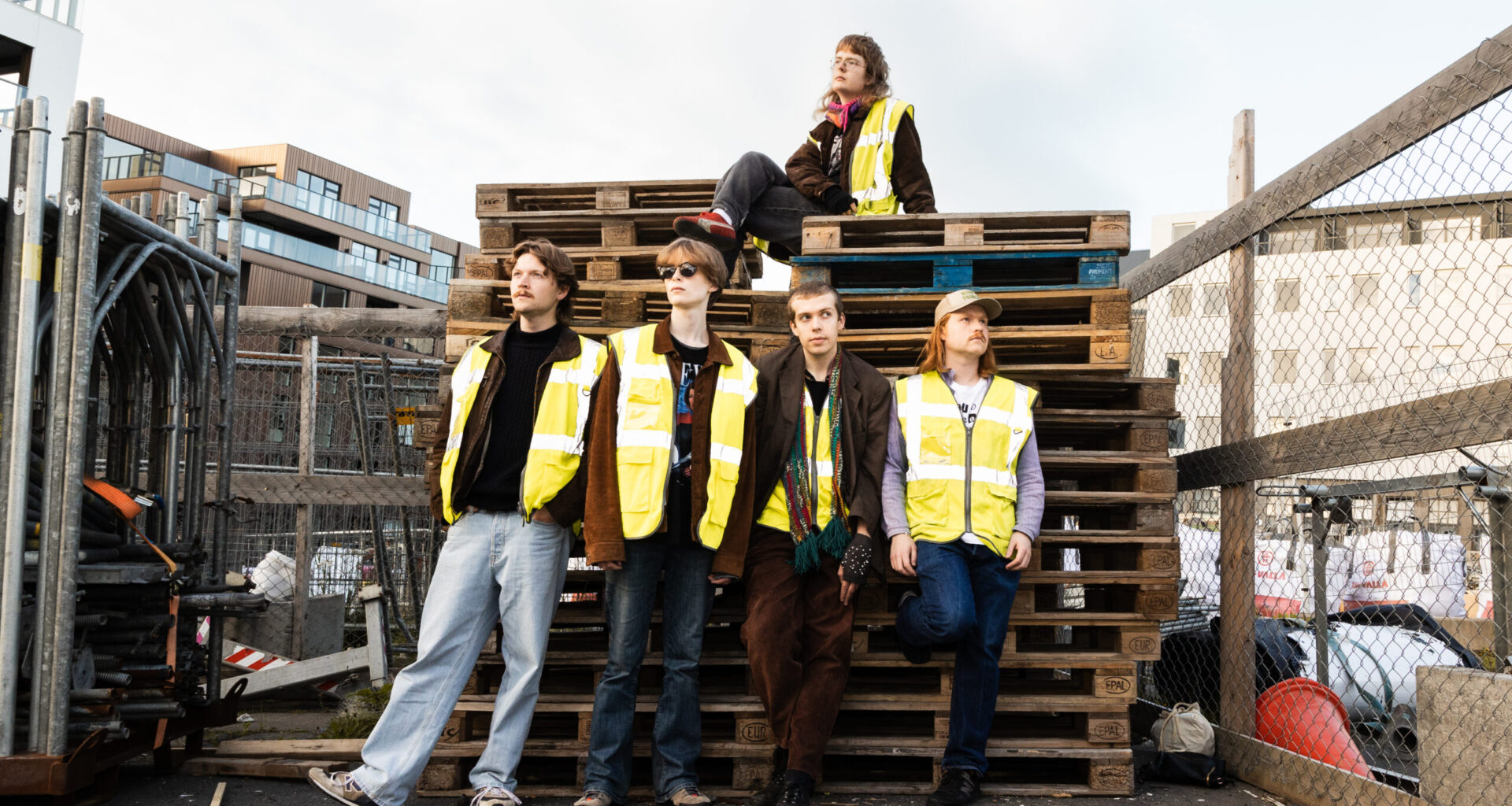The quintet discusses their inspirations, debut album, and enigmatic name
I meet BKPM in the basement of 12 Tónar, just four days after their release concert that was held in the very same space. “I felt the energy was quite electric,” drummer Rósa Sif Welding Kristinsdóttir reflects, then Jón Logi Pálma, vocalist and bassist, laughs and adds, “For more ways than one.” “Me and Víf both got electrocuted,” explains synth-player Óðal Hjarn Grétu. The electrifying performance in question was a celebration of the release of BKPM’s debut album Bíddu Ha?, which dropped on August 3.
The group consists of Jón, Óðal, and Rósa, with guitarists Ásgeir Kjartansson and Víf Ásdísar Svansbur completing their quintet. BKPM is difficult to describe quickly; I’d venture to say that they are the poster children for the idea that Icelandic musicians “have no respect for genre” (words I heard at Sátan Metal Festival), and that’s why Icelandic musicians don’t sound like anyone else.
“All of the different songs on this album have different periods and different genres in them,” Óðal says. “I just think that it’s — like, Jón is so full of influences that it’s a little bit hard to keep up with.” Rósa explains BKPM’s genre affiliations like someone recounting a recipe: “It begins with a base of proto and post-punk, with kraut-rock influence,” she starts, then continues that all band members bring their own influences (ingredients) to the BKPM soup. Óðal and Ásgeir are classically trained, and Rósa has heavy metal, noise, and math rock influences. “It all morphs into some sort of ball of slime,” as Rósa puts it.
Battle-tested songs
The group came together around Músíktilraunir 2023, made it to the finals, and started performing live from there. They intended to put out an EP, but, as Jón describes it, “I think it was Víf who specifically pushed me, like, ‘no, no, no, no, no, no, make a full album. Everyone’s doing an EP these days.’” From there, the group rehearsed, performed live, and doubled their count of five songs to ten.
“All of the different songs on this album have different periods and different genres in them. “
Taking time before recording the album has allowed them to perfect their repertoire —“when I play ‘Bílalag 1’ live, it feels like putting on a jacket I’ve worn for a while. It’s kind of battle-tested,” Rósa says — except, I learn, for the final song on Bíddu Ha? “Rífa Það Niður” is an epic finale that flirts with the 17-minute mark. “We finally finished writing the last song on the album, like two days before,” Rósa explains. “That was kind of weird to do, because it was still so fresh, but it was still very fun and explosive.” “I read Geordie Greep say that the first time you get the song right, it’s the best the song will ever sound. I think that happened on the last song,” adds Óðal.
An integral part to “Rífa Það Niður,” or any BKPM song for that matter, are the lyrics. As the lyricist, Jón effortlessly flits between the satirical and the serious, often even intertwining them. “All except two of the songs are sort of inspired by work and burning out a lot,” Jón says. For instance, their song “Fyrsti Dagurinn” is a delirious saga of showing up for your first day of work and your boss ends up being a vampire, but also uses the vampire trope to say that work sucks you dry. Even in their retelling of the song’s inspiration, Jón shares two muses: “I was working at the pizza place and there was a lot of pizza sauce that was red in my mind at the time,” and how telling their boss they were stressed only led to the boss saying, “Hey, don’t stress. You work worse when you’re stressed.”
“Yeah, you have some crazy lyrics,” Rósa concludes. “But a lot of the time they’re very beautiful.”
What’s in an acronym?
A hallmark of BKPM is their donning of neon yellow construction vests for every performance. “Those vests are from my actual job at a warehouse,” Jón says. “I just asked my boss if I could borrow some, and they haven’t asked for them back, so this is just our look now.” Rósa continues, “I also think it adds something to the lyrics because you’re talking about your work, and how work and capitalism make you — yeah, burnt out and sad.”
Ruminating on the effects of capitalism on their music is a theme for BKPM. “I love music to my bones,” Rósa states at one point. “The best I feel is when we’re on stage playing music with other people, especially in front of other people, and writing music… but the business aspect of that is something that I do not care for.” Jón agrees, sharing, “We haven’t been very good at marketing; we’ve been sort of surviving on a word-of-mouth basis. But also it feels like [that’s how] the sort of bands that I’m inspired by [do it].” “The work you have to put in to be both good at the music bit and the business bit is as-tro-nomical,” laments Rósa, stressing the last word.
Towards the end of our conversation, I still have a final curiosity. When they perform live, the group often shouts out various meanings behind their “BKPM” acronym, and I want to know if there’s an official one. “The meaning of BKPM is in everyone’s hearts,” Jón answers. Rósa quickly adds, “Well, the correct answer is binary, killed, patriarchy, murder.” Jón counters, “No, it’s bass, klarinett, punk music,” and they descend into listing further possibilities for the title’s meaning.
“I like the idea of just, you know, having an air of mystery to our band,” Jón concludes. “Like, who are we? What do we stand for?”
To find out a bit more about what BKPM stands for, listen to Bíddu Ha?, available now on Bandcamp and other streaming platforms.
